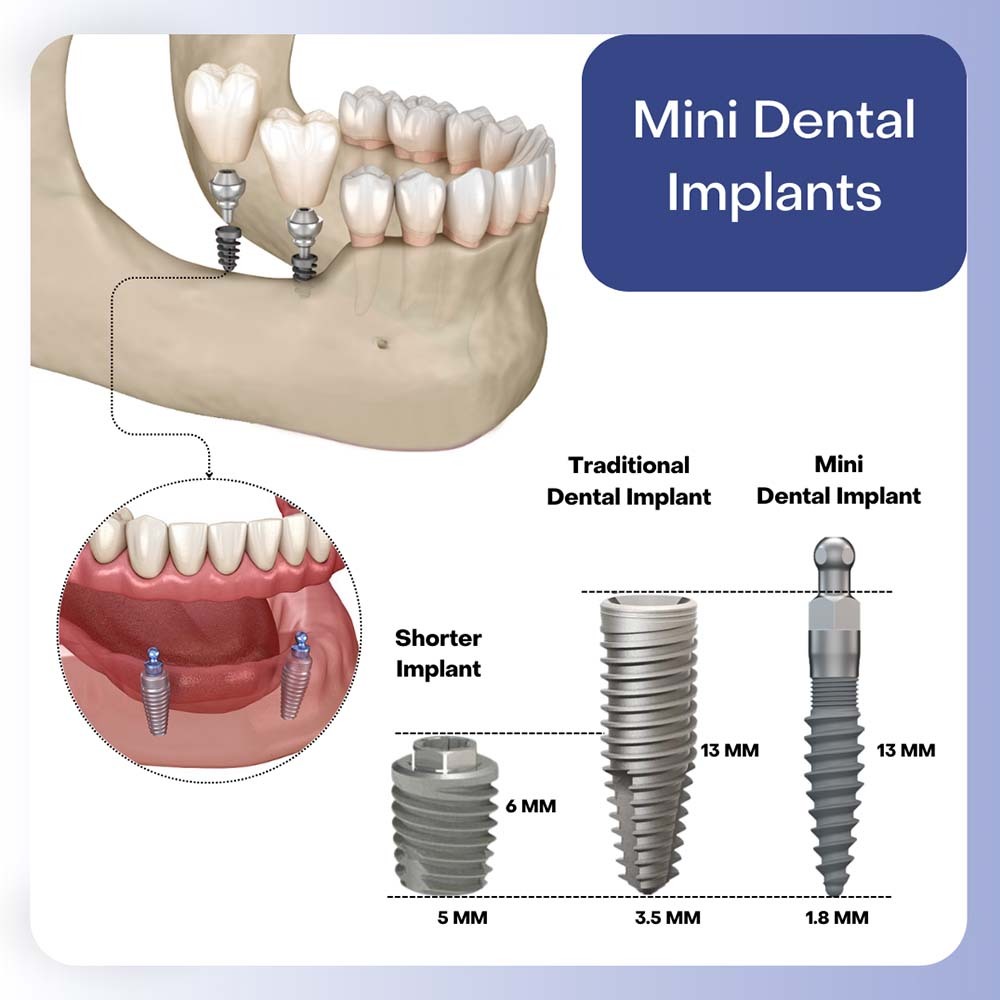Table of contents
Dental implants are an increasingly popular choice for replacing one or more missing teeth. Mini dental implants are an implant system that may be recommended when traditional dental implants aren’t suitable. They are only used in specific situations but can provide some useful benefits.
 Mini dental implants generally have a one-piece construction, combining the implant post or screw and the connector or abutment. They are narrower than traditional implants, typically less than 3 mm in diameter. In comparison, a traditional dental implant has an implant screw and a separate connector or implant abutment. They have a diameter of between 3.25 mm and 5 mm.
Mini dental implants generally have a one-piece construction, combining the implant post or screw and the connector or abutment. They are narrower than traditional implants, typically less than 3 mm in diameter. In comparison, a traditional dental implant has an implant screw and a separate connector or implant abutment. They have a diameter of between 3.25 mm and 5 mm.
Mini dental implants can be used to replace single missing teeth or multiple missing teeth. Possible benefits of this implant system include:
Mini dental implants are often used to stabilize dentures. The one-piece implants have special abutments designed to click into corresponding attachments on the fitting surface of the denture. Because they are cheaper than traditional implants, this can be a cost-effective solution for loose dentures.
The procedure to place mini dental implants is minimally invasive. They are inserted directly through the gum, so there is no need for incisions into the gum tissue or stitches. Consequently, recovery afterward is quicker.
Usually, mini dental implants cost less than traditional dental implants. This is due to their reduced size and one-piece construction.
Mini dental implants can reduce the need for bone grafting, making them a useful choice for people without adequate bone to support traditional dental implants.
Mini dental implants are often suitable for restoring smaller teeth with inadequate room for traditional-sized implants. For example, if you lose a lower front incisor, there may not be enough room to insert an ordinary implant. They are also more suitable for people with smaller jaws.
Sometimes, mini dental implants can be restored on the same day of surgery. Same-day dental implants may be possible because the implant restoration will splint the implants together, preventing any tooth movements while the implants heal. However, it’s important to note this is almost certainly likely to be a temporary restoration that will be restored with a permanent restoration once the implants have healed.
If you restore a single missing tooth with a single dental implant, the temporary restoration will be designed so the implant is out of your bite. When you bite your teeth together, your temporary restoration will not bite against the opposing tooth to ensure it will not be disturbed during healing. The temporary restoration is merely for cosmetic purposes.
Choosing mini dental implants can provide good results, improving dental health and appearance. They are not right for everyone, so you will need a full consultation to determine if they might help you.
Mini implants aren’t suitable for people with bruxism, where they grind their teeth. They are also less suitable for people with health conditions like diabetes, advanced gum disease or periodontitis, and immune conditions that can affect healing after implant surgery.
Certain lifestyle conditions or health issues can also affect your suitability for treatment, including:
Although the smaller diameter of mini dental implants means less jawbone is required for insertion, they still need a certain amount of healthy bone. You may be less suitable if you have suffered from severe jawbone loss. People with poor gum health may also be less able to have mini implants successfully.
After your initial consultation, we must complete diagnostic tests, including a cone beam CT scan and digital dental x-rays. These allow us to identify optimal positions for each implant and to create your surgical plan.
The exact process for implant placement can vary depending on your needs, but generally follows the steps below.
Because treatment is minimally invasive, recovery should be quick and easy. Most people can return to everyday life after a day or two. You may experience minor discomfort that is easily controlled with over-the-counter pain relievers. Otherwise, we can prescribe medication to help relieve any pain.
After your implant surgery, avoid eating very hard or sticky foods. Instead, stick to softer foods like mashed potatoes, soup, yogurt, and smoothies while your implants heal. We can advise you on how soon you can safely eat a more varied diet.
Complications after surgery are rare, but if you experience implant pain or are concerned that your jaw feels numb, please get in touch with us so we can assess the situation and provide suitable treatment quickly.
Before you leave our surgery, we will show you how to care for your mini dental implants and clean them thoroughly. It’s important to brush, floss, and clean them as directed to ensure the tissues around your implants remain strong, healthy, and infection-free.
Regular dental exams and hygiene appointments allow us to assess the condition of your mini implants and the restorations and clean them professionally. If you have a mini denture implant, we can replace the denture fitments when required.
Mini dental implants are one of the newer implant systems, so they have been less widely studied for longevity and durability. However, they can be an excellent solution for tooth loss in specific circumstances. Mini-implant dentures are especially useful for people who need to affordably restore a complete arch of teeth.

My name is Victoria Kushensky. I am a general dentist dedicated to remaining at the forefront of my field. Combining compassionate care with extensive knowledge, I offer cosmetic and general dentistry services as well as advanced root canal treatments.
I earned my Doctor of Dental Surgery (DDS) degree from the esteemed New York University College of Dentistry. Throughout my career, I have honed my skills in various dental procedures, ensuring effective treatment for each patient’s unique needs. I prioritize patient comfort and understanding, taking the time to thoroughly explain procedures and address any questions.
More about Dr. KushenskyMy NJ Dentist: Victoria Kushensky, DDS
385 Prospect Ave Suite 304
Hackensack, NJ 07601
(201) 298-8000